#uaw
Explore tagged Tumblr posts
Text
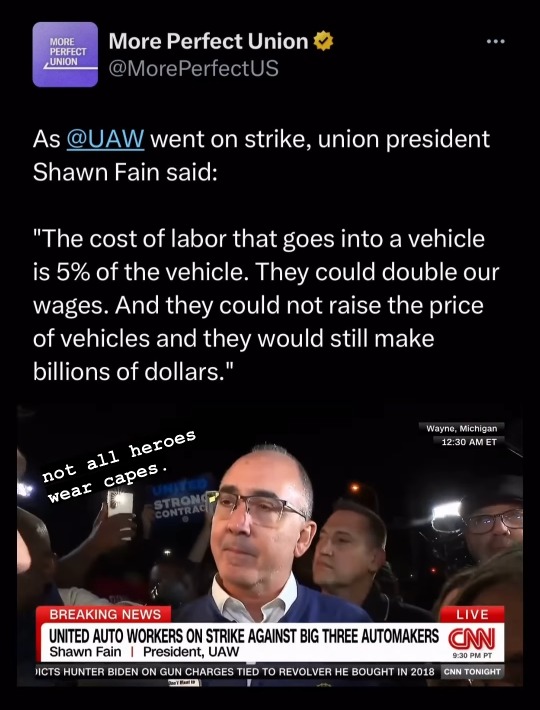
Shareholder economics is starving workers and exploiting labor.
6K notes
·
View notes
Text
"Efficiency" left the Big Three vulnerable to smart UAW tactics
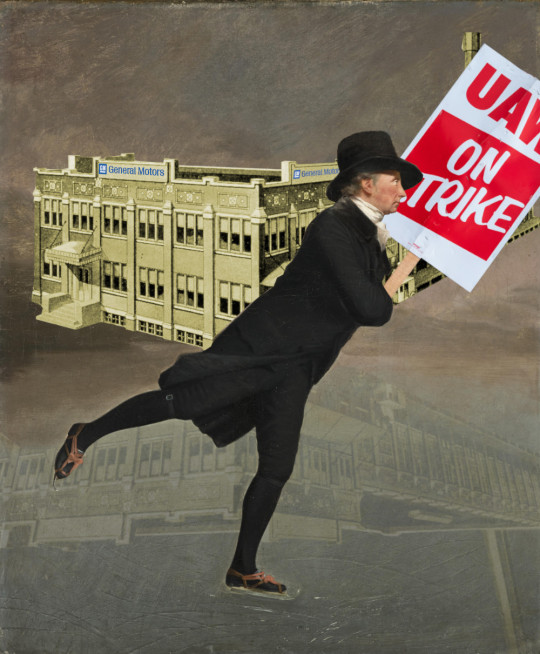
Tomorrow (September 22), I'm (virtually) presenting at the DIG Festival in Modena, Italy. Tomorrow night, I'll be in person at LA's Book Soup for the launch of Justin C Key's "The World Wasn’t Ready for You." On September 27, I'll be at Chevalier's Books in Los Angeles with Brian Merchant for a joint launch for my new book The Internet Con and his new book, Blood in the Machine.

It's been 143 days since the WGA went on strike against the Hollywood studios. While early tactical leaks from the studios had studio execs chortling and twirling their mustaches about writers caving once they started losing their homes, the strikers aren't wavering – they're still out there, pounding the picket lines, every weekday:
https://www.cnbc.com/2023/08/09/how-hollywood-writers-make-ends-meet-100-days-into-the-writers-guild-strike.html
The studios obviously need writers. That gleeful, anonymous studio exec who got such an obvious erotic charge at the thought of workers being rendered homeless as punishment for challenging his corporate power completely misread the room, and his comments didn't demoralize the writers. Instead, they inspired the actors to go on strike, too.
But how have the writers stayed out since May Day? How have the actors stayed out for 69 days since their strike started on Bastille Day? We can thank the studios for that! As it turns out, the studios have devoted so much energy to rendering creative workers as precarious as possible, hiring as little as they can getting away with and using punishing overtime as a substitute for adequate staffing that they've eliminated all the workers who can't survive on side-hustles and savings for six or seven months at a time.
But even for those layoff-hardened workers, long strikes are brutal, and of course, all the affiliated trades, from costumers to grips, are feeling the pain. The strike fund only goes so far, and non-striking, affected workers don't even get that. That's why I've been donating regularly to the Entertainment Community Fund, which helps all affected workers out with cash transfers (I just gave them another $500):
https://secure2.convio.net/afa/site/Donation2?df_id=8117&8117.donation=form1&mfc_pref=T
As hot labor summer is revealed as a turning point – not just a season – long strikes will become the norm. Bosses still don't believe in worker power, and until they get their minds right, they're going to keep on trying to starve their workforces back inside. To get a sense of how long workers will have to hold out, just consider the Warrior Met strike, where Alabama coal-miners stayed out for 23 months:
https://www.thenation.com/article/activism/warrior-met-strike-union/
As Kim Kelly explained to Adam Conover in the latest Factually podcast, the Alabama coal strikers didn't get anywhere near the attention that the Hollywood strikers have enjoyed:
https://www.youtube.com/watch?v=UvyMHf7Yg0Q
(To learn more about the untold story of worker organizing, from prison unions to the key role that people of color and women played in labor history, check out Kelly's book, "Fight Like Hell," now in paperback:)
https://www.simonandschuster.com/books/Fight-Like-Hell/Kim-Kelly/9781982171063
Which brings me to the UAW strike. This is an historic strike, the first time that the UAW has struck all of the Big Three automakers at once. Past autoworkers' strikes have marked turning points for all American workers. The 1945/46 GM strike established employers' duty to cover worker pensions, health care, and cost of living allowances. The GM strike created the American middle-class:
https://prospect.org/labor/2023-09-18-uaw-strikes-built-american-middle-class/
The Big Three are fighting for all the marbles here. They are refusing to allow unions to organize EV factories. Given that no more internal combustion cars will be in production in just a few short years, that's tantamount to eliminating auto unions altogether. The automakers are flush with cash, including billions in public subsidies from multiple bailouts, along with billions more from greedflation price-gouging. A long siege is inevitable, as the decimillionaires running these companies earn their pay by starving out their workers:
https://www.businessinsider.com/general-motors-ceo-mary-barra-salary-auto-workers-strike-uaw-2023-9
The UAW knows this, of course, and their new leadership – helmed by the union's radical president Shawn Fain – has a plan. UAW workers are engaged in tactical striking, shutting down key parts of the supply chain on a rolling basis, making the 90-day strike fund stretch much farther:
https://prospect.org/blogs-and-newsletters/tap/2023-09-18-labors-militant-creativity/
In this project, they are greatly aided by Big Car's own relentless pursuit of profit. The automakers – like every monopolized, financialized sector – have stripped all the buffers and slack out of their operations. Inventory on hand is kept to a bare minimum. Inputs are sourced from the cheapest bidder, and they're brought to the factory by the lowest-cost option. Resiliency – spare parts, backup machinery – is forever at war with profits, and profits have won and won and won, leaving auto production in a brittle, and easily shattered state.
This is especially true for staffing. Automakers are violently allergic to hiring workers, because new workers get benefits and workplace protection. Instead, the car companies routinely offer "voluntary" overtime to their existing workforce. By refusing this overtime, workers can kneecap production, without striking.
Enter "Eight and Skate," a campaign among UAW workers to clock out after their eight hour shift. As Keith Brower Brown writes for Labor Notes, the UAW organizers are telling workers that "It’s crossing an unofficial picket line to work overtime. It’s helping out the company":
https://labornotes.org/2023/09/work-extra-during-strike-auto-workers-say-eight-and-skate
Eight and Skate has already started to work; the Buffalo Ford plant can no longer run its normal weekend shifts because workers are refusing to put in voluntary overtime. Of course, bosses will strike back: the next step will be forced overtime, which will lead to the unsafe conditions that unionized workers are contractually obliged to call paid work-stoppages over, shutting down operations without touching the strike fund.
What's more, car bosses can't just halt safety stoppages or change the rules on overtime; per the UAW's last contract, bosses are required to bargain on changes to overtime rules:
https://uaw.org/wp-content/uploads/2023/09/Working-Without-Contract-FAQ-FINAL-2.pdf
Car bosses have become lazily dependent on overtime. At GM's "highly profitable" SUV factory in Arlington, TX, normal production runs a six-days, 24 hours per day. Workers typically work five eight-hour days and nine hours on Saturdays. That's been the status quo for 11 years, but when bosses circulated the usual overtime signup sheet last week, every worker wrote "a big fat NO" next to their names.
Writing for The American Prospect, David Dayen points out that this overtime addiction puts a new complexion on the much-hyped workerpocalypse that EVs will supposedly bring about. EVs are much simpler to build than conventional cars, the argument goes, so a US transition to EVs will throw many autoworkers out of work:
https://prospect.org/labor/2023-09-20-big-threes-labor-shortages-uaw/
But the reality is that most autoworkers are doing one and a half jobs already. Reducing the "workforce" by a third could leave all these workers with their existing jobs, and the 40-hour workweek that their forebears fought for at GM inn 1945/46. Add to that the additional workers needed to make batteries, build and maintain charging infrastructure, and so on, and there's no reason to think that EVs will weaken autoworker power.
And as Dayen points out, this overtime addiction isn't limited to cars. It's also endemic to the entertainment industry, where writers' "mini rooms" and other forms of chronic understaffing are used to keep workforces at a skeleton crew, even when the overtime costs more than hiring new workers.
Bosses call themselves job creators, but they have a relentless drive to destroy jobs. If there's one thing bosses hate, it's paying workers – hence all the hype about AI and automation. The stories about looming AI-driven mass unemployment are fairy tales, but they're tailor made for financiers who get alarming, life-threatening priapism at the though of firing us all and replacing us with shell-scripts:
https://pluralistic.net/2023/03/09/autocomplete-worshippers/#the-real-ai-was-the-corporations-that-we-fought-along-the-way
This is why Republican "workerism" rings so hollow. Trump's GOP talks a big game about protecting "workers" (by which they mean anglo men) from immigrants and "woke captialism," but they have nothing to say about protecting workers from bosses and bankers who see every dime a worker gets as misappropriated from their dividend.
Unsurprisingly, conservative message-discipline sucks. As Luke Savage writes in Jacobin, for every mealymouthed Josh Hawley mouthing talking points that "support workers" by blaming China and Joe Biden for the Big Three's greed, there's a Tim Scott, saying the quiet part aloud:
https://jacobin.com/2023/09/republicans-uaw-strike-hawley-trump-scott/
Quoth Senator Scott: "I think Ronald Reagan gave us a great example when federal employees decided they were going to strike. He said, you strike, you’re fired. Simple concept to me. To the extent that we can use that once again, absolutely":
https://twitter.com/American_Bridge/status/1704136706574741988
The GOP's workerism is a tissue-thin fake. They can never and will never support real worker power. That creates an opportunity for Biden and Democrats to seize:
https://pluralistic.net/2023/09/18/co-determination/#now-make-me-do-it
Reversing two generations of anti-worker politics is a marathon, not a sprint. The strikes are going to run for months, even years. Every worker will be called upon to support their striking siblings, every day. We can do it. Solidarity now. Solidarity forever.



If you'd like an essay-formatted version of this post to read or share, here's a link to it on pluralistic.net, my surveillance-free, ad-free, tracker-free blog:
https://pluralistic.net/2023/09/21/eight-and-skate/#strike-to-rule
4K notes
·
View notes
Text
Striking autoworkers tricked the “Big 3” corporations into thinking strike would be taking place at incorrect locations, foiling their anti-strike preparations and inflicting financial damage.
4K notes
·
View notes
Text
Paul Blest at More Perfect Union:
Thousands of workers at a Volkswagen plant in Chattanooga, Tennessee have voted to join the United Auto Workers, defying an all-out union-busting effort from the state’s political leaders and marking a key victory for the United Auto Workers in their renewed effort to organize the South and non-union plants.
Unofficial results tallied Friday showed that after three days of voting, more than two-thirds of workers voted to join the UAW. The win in Chattanooga is the first successful attempt to organize a non-union automaker in decades and comes after multiple failed attempts to organize the plant, including in 2014 and 2019. More than 4,300 workers were eligible to vote this week. “I can't explain it. It's not like the first times,” Renee Berry, who has worked at the Chattanooga plant for 14 years and through two prior facility-wide votes, told us in the lead-up to the election. “The first few times was hell…now it's like we can roll our shoulders back, because we got it.” Volkswagen is the world’s largest auto company by revenue, and until today, every one of its plants around the globe has been unionized except for one.
"This is going to be in history books down the road. This is huge—forever huge,” Robert Soderstrom, a worker at the plant, told More Perfect Union. “People recognize for the first time in a long time, on a mass scale, that there's got to be some changes. And some of the power and stuff that's gone to the corporate world needs to come back to us little guys.” The victory in Tennessee continues a winning streak for the UAW, which negotiated record contracts at the Detroit Three of Ford, GM, and Stellantis last year following a lengthy “stand-up” strike. After passing the contracts, UAW President Shawn Fain announced a $40 million effort to organize non-union U.S. plants, largely based in right-to-work states like Tennessee and owned by auto companies based in Europe, Japan, and South Korea, as well as EV manufacturers like Tesla and Rivian.
Since launching that new effort, more than 10,000 autoworkers around the country have signed union cards, according to the UAW. Earlier this month, workers at a Mercedes plant in Vance, Alabama became the second group to file for an election, which will be held from May 13 to 17. Alabama Gov. Kay Ivey and the state Chamber of Commerce have forcefully opposed the unionization effort, claiming it would hurt Alabama autoworkers—who, even before the pandemic, were making less than they did in 2002 when adjusted for inflation. The same dynamic has played out in Tennessee. Gov. Bill Lee, who denounced the last unsuccessful union campaign in 2019, said it would be a “mistake” for workers at the Chattanooga plant to unionize and boasted about the state’s “right-to-work” law.
🚨🚨 BREAKING:🚨🚨 Workers at the Volkswagen (VW) plant in Chattanooga have voted yes to join the United Auto Workers (UAW) after 2 failed attempts in 2014 and 2019. #UAW #VWChattanooga #1u
#Unionizaion#Unions#Labor#Labor Unions#Workers' Rights#VW Chattanooga#Chattanooga Tennessee#US News#Chattanooga#UAW#United Auto Workers#Volkswagen#VW#UAW Strike
442 notes
·
View notes
Text
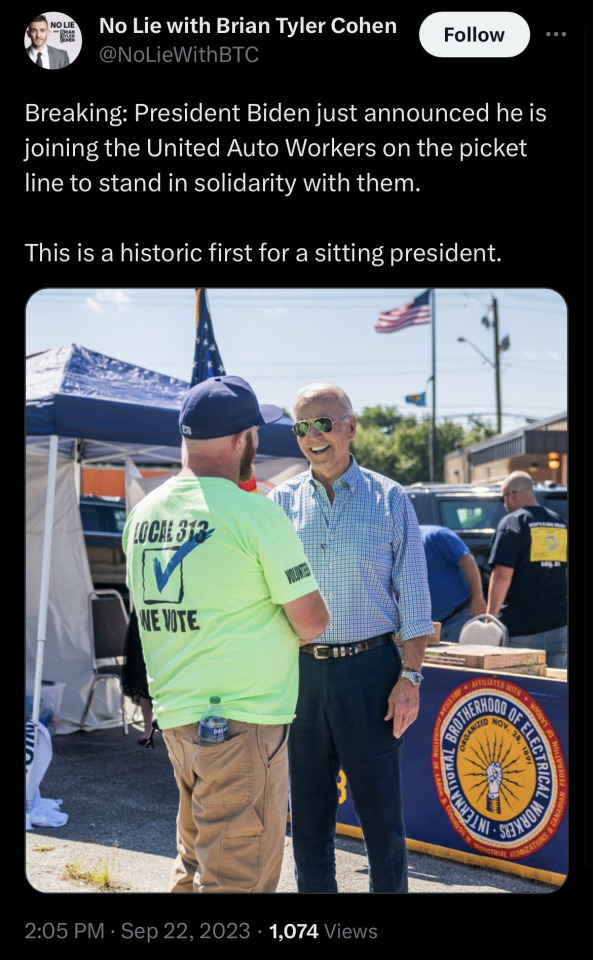
I am suddenly okay-ish with living in historic times
1K notes
·
View notes
Text
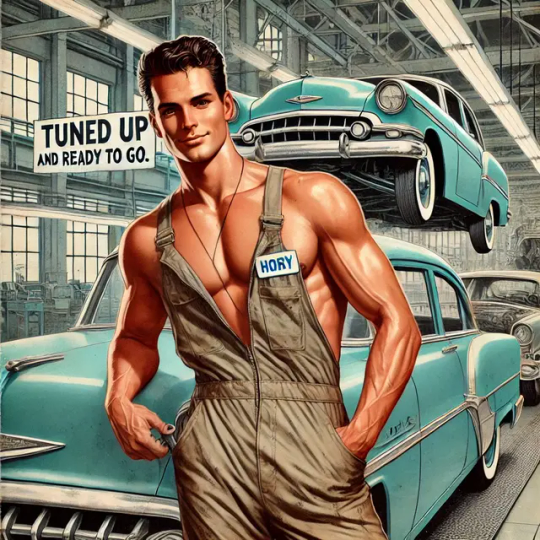
Men At Work Pin-up Calendar (Mr. December) - Autoworker
"Tuned Up and Ready to Go."
#metamorphicmuse#dall e#ai artwork#ai male#ai image#male beauty#ai art#handsome male#gay art#gay#vintage#1950s#advertising#pinup art#calendar#december#uaw#autoworker#union#manual labor#classic car#male physique#masculine#hard at work#mr december#factory#assembly line
79 notes
·
View notes
Text
WGA reaching a tentative agreement with studios after striking for months shows the profound strength workers have through organizing and collective action. SAG-AFTRA next. Then UAW.
Join a union.
Solidarity forever
#unionize#unions#working class#workers rights#news#current events#capitalism#eat the rich#collective action#the left#wga strike#writers strike#uaw#sag aftra
644 notes
·
View notes
Text









Source
#grant miner#uaw#columbia university#encampments#hamilton hall#free speech#peace activist#resistance
40 notes
·
View notes
Text
For as long as anyone can remember, the Indiana city of Kokomo has been a conservative stronghold. Ronald Reagan crushed Walter Mondale in Kokomo. Bill Clinton lost twice. So did Barack Obama. The current mayor, a Republican, is running unopposed for re-election. It’s a town known for something it would prefer to forget: a Ku Klux Klan rally in 1923 that was the largest ever. Yet somehow Kokomo produced a union leader whose rhetoric is aimed at toppling the conservative and moneyed classes — a rebel who rejects the niceties of an earlier era in favor of a sharp-edged confrontation. “Billionaires in my opinion don’t have a right to exist,” says Shawn Fain, who is leading the United Automobile Workers in a multifront labor battle against the Big Three carmakers that has little precedent and is making a lot of noise. In interviews, in speeches and on social media, Mr. Fain hammers the wealthy again and again, making the cause of the union’s 150,000 autoworkers at General Motors, Ford Motor and Stellantis something much broader. “There’s a billionaire class, and there’s the rest of us,” he said at an impromptu news conference outside a Ford plant in Wayne, Mich. “We’re all expected to sit back and take the scraps and live paycheck to paycheck and scrape to get by. We’re second-class citizens.”
586 notes
·
View notes
Text
Seven thousand more UAW members just walked off the job, expanding the strike to two more plants. Twenty-five thousand autoworkers are now on strike, and the walkout could continue to escalate if the Big Three don’t budge in negotiations.
[UAW president Shawn] Fain announced that Stellantis would be spared this time. The union had been expected to strike all three companies, but, said Region 1 director LaShawn English, three minutes before Fain was scheduled to go on Facebook Live, the UAW received frantic emails from company representatives.
[Note: Love that for the UAW. Also laughing so hard. Three minutes before the next round of strikes were annouced!!]
According to Fain, Stellantis made “significant progress” on cost-of-living allowances, the right not to cross a picket line, and the right to strike over product commitments and plant closures. “We are excited about this momentum at Stellantis and hope it continues,” Fain said...
“See You Next Week — Maybe?”
“These guys wanted to go out a long time ago,” said Cody Zaremba, a Local 602 member at the Lansing GM plant after the news broke that his plant would be joining the strike. “We’re ready. Everybody, truly, I believe, in the entire membership. They’re one with what’s going on.”
Five thousand workers at thirty-eight parts distribution centers across twenty-one states have been on strike since last Friday [September 22, 2023], along with thirteen thousand at three assembly plants in Michigan, Ohio, and Missouri who walked out on September 15. (See a map of all struck facilities here.) ...
The UAW is now calling on community supporters to organize small teams to canvass dealerships that sell and repair Big Three cars and trucks. On Tuesday, the union issued a canvassing tool kit with instructions, flyers, press releases, and talking points.
In negotiations with Ford and GM, autoworkers have clinched some important gains. Among them is an agreement by both companies to end at least one of the many tiers in current contracts, putting workers at certain parts plants back on the same wage scale as assembly workers. The top rate for Big Three assembly workers is currently around $32...
Ford was spared in last week’s escalation, because bargainers there had made further progress on gains for workers.
But today, the UAW once again called out workers at Ford and GM, putting some muscle behind its bold demands — a big wage boost, a shorter workweek, elimination of tiers, cost-of-living adjustments tied to inflation, protection from plant closures, conversion of temps to permanent employees, and the restoration of retiree health care and benefit-defined pensions to all workers.
-via Jacobin, September 29, 2023. Article continues below.
Keep Them Guessing
This year, for the first time in recent history, the union has played the three auto companies against each other with its strike strategy, departing from the union’s tradition of choosing one target company and patterning an agreement at the other two.
The stand-up strike strategy draws inspiration from an approach known as CHAOS (Create Havoc Around Our System), first deployed in 1993 by Alaska Airlines flight attendants, who announced they would be striking random flights. Although they struck only seven flights in a two-month period, Alaska had to send scabs on every plane, just in case. The unpredictability drew enormous media attention and drove management up the wall. Meanwhile the union was able to conserve its strength and minimize risk.
The companies miscalculated where the UAW was going to strike first, stockpiling engines and shipping them cross-country to the wrong facilities. Autoworkers relished the self-inflicted supply chain chaos on UAW Facebook groups and other social media platforms.
Nonstrikers’ morale on the factory floor has gotten a boost from rank and filers organizing to refuse voluntary overtime. With support both from Fain and the reform caucus Unite All Workers for Democracy (UAWD), workers have been encouraging each other to “Eight and Skate,” meaning to turn down extra work and decline to do management any favors.
Majority Public Support
A majority of Americans support the UAW strikers, and the Big Three have taken a PR hit since the strike began, according to a new survey conducted by the business intelligence firm Caliber.
“Eighty-seven percent of respondents told us they were aware of the strike,” Caliber CEO Shahar Silbershatz told the Intercept. “It’s clear the strike is not just causing commercial repercussions, but reputational repercussions as well.”
These reputational repercussions will only worsen...
"We Can Unmake It"
Fain didn't pull any punches in his speech... “That’s what’s different about working-class people. Whether we’re building cars or trucks or running parts distribution centers; whether we’re writing movies or performing TV shows... we do the heavy lifting. We do the real work. Not the CEOs, not the executives.
"And though we don’t know it, that’s what power is. We have the power. The world is of our making. The economy is of our making. This industry is of our making.
“And as we’ve shown, when we withhold our labor, we can unmake it.”
-via Jacobin, September 29, 2023
#united states#us politics#organized labor#uaw#uaw strike#united auto workers#auto workers#labor rights#uaw strong#worker rights#unions#labor unions#strike#unionize#auto industry#ford#general motors#stellantis#working class#cars#michigan#ohio#missouri#solidarity forever#hot labor summer
467 notes
·
View notes
Text
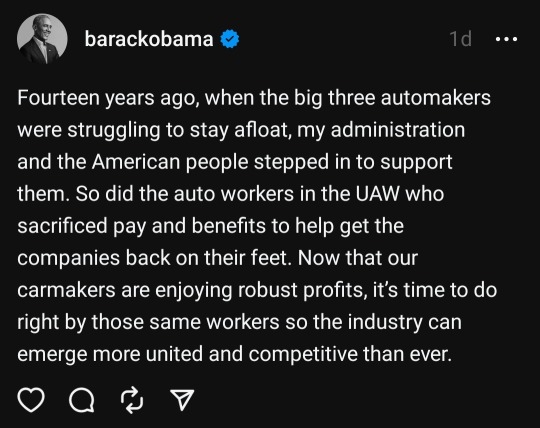
Working class solidarity.
1K notes
·
View notes
Text
The unexpected upside of global monopoly capitalism

I'm touring my new, nationally bestselling novel The Bezzle! Catch me TODAY (Apr 10) at UCLA, then Chicago (Apr 17), Torino (Apr 21) Marin County (Apr 27), Winnipeg (May 2), Calgary (May 3), Vancouver (May 4), and beyond!

Here's a silver lining to global monopoly capitalism: it means we're all fighting the same enemy, who is using the same tactics everywhere. The same coordination tools that allow corporations to extend their tendrils to every corner of the Earth allows regulators and labor organizers to coordinate their resistance.
That's a lesson Mercedes is learning. In 2023, Germany's Supply Chain Act went into effect, which bans large corporations with a German presence from using child labor, violating health and safety standards, and (critically) interfering with union organizers:
https://www.bafa.de/EN/Supply_Chain_Act/Overview/overview_node.html
Across the ocean, in the USA, Mercedes has a preference for building its cars in the American South, the so-called "right to work" states where US labor law is routinely flouted and unions are thin on the ground. As The American Prospect's Harold Meyerson writes, the only non-union Mercedes factories in the world are in the US:
https://prospect.org/labor/2024-04-08-american-workers-german-law-uaw-unions/
But American workers – especially southern workers – are on an organizing tear, unionizing their workplaces at a rate not seen in generations. Their unprecedented success is down to their commitment, solidarity and shrewd tactics – all buoyed by a refreshingly pro-worker NLRB, who have workers' backs in ways also not seen since the Carter administration:
https://pluralistic.net/2023/09/14/prop-22-never-again/#norms-code-laws-markets
Workers at Mercedes' factory in Vance, Alabama are trying to join the UAW, and Mercedes is playing dirty, using the tried-and-true union-busting tactics that have held workplace democracy at bay for decades. The UAW has lodged a complaint with the NLRB, naturally:
https://www.commondreams.org/news/alabama-mercedes-benz
But the UAW has also filed a complaint with BAFA, the German regulator in charge of the Supply Chain Act, seeking penalties against Mercedes-Benz Group AG:
https://uaw.org/uaw-files-charges-in-germany-against-mercedes-benz-companys-anti-union-campaign-against-u-s-autoworkers-violates-new-german-law-on-global-supply-chain-practices/
That's a huge deal, because the German Supply Chain Act goes hard. If Mercedes is convicted of union-busting in Alabama, its German parent-company faces a fine of 2% of its global total revenue, and will no longer be eligible to sell products to the German government. Chomp.
Now, the German Supply Chain Act is new, and this is the first petition filed by a non-German union with BAFA, so it's not a slam dunk. But supermajorities of Mercedes workers at the Alabama factory have signed UAW cards, and the election is going to happen in May or June. And the UAW – under new leadership, thanks to a revolution that overthrew the corrupt old guard – has its sights set on all the auto-makers in the American south.
As Meyerson writes, the south is America's onshore offshore, a regulatory haven where corporations pay minimal or no tax and are free to abuse their workers, pollute, and corrupt local governments with a free hand (no wonder American industry is flocking to these states). Meyerson: "The economic impact of unionizing the South, in other words, could almost be placed in the same category as reshoring work that had gone to China."
The German Supply Chain Act was passed with the help of Germany's powerful labor unions, in an act of solidarity with workers employed by German companies all over the world. This is that unexpected benefit to globalism: the fact that Mercedes has extrusions into both the American and German political spheres means that both American and German workers can collaborate to bring it to heel.
The same is true for antitrust regulators. The multinational corporations that are in regulators' crosshairs in the US, the EU, the UK, Australia, Japan, South Korea and beyond use the same playbook in every country. That's doubly true of Big Tech companies, who literally run the same code – embodying the same illegal practices – on servers in every country.
The UK's Competition and Markets Authority has led the pack on convening summits where antitrust enforcers from all over the world gather to compare notes and collaborate on enforcement strategies:
https://www.eventbrite.co.uk/e/cma-data-technology-and-analytics-conference-2022-registration-308678625077
And the CMA's Digital Markets Unit – which boasts the the largest tech staff of any competition regulator in the world – produces detailed market studies that turn out to be roadmaps for other territories' enforces to follow – like this mobile market study:
https://assets.publishing.service.gov.uk/media/63f61bc0d3bf7f62e8c34a02/Mobile_Ecosystems_Final_Report_amended_2.pdf
Which was extensively referenced in the EU during the planning of the Digital Markets Act, and in the US Congress for similar legislation:
https://www.congress.gov/bill/117th-congress/senate-bill/2710
It also helped enforcers in Japan:
https://asia.nikkei.com/Business/Technology/Japan-to-crack-down-on-Apple-and-Google-app-store-monopolies
And South Korea:
https://www.reuters.com/technology/skorea-considers-505-mln-fine-against-google-apple-over-app-market-practices-2023-10-06/
Just as Mercedes workers in Germany and the USA share a common enemy, allowing for coordinated action that takes advantage of vulnerable flanks wherever they are found, anti-monopoly enforcers are sharing notes, evidence, and tactics to strike at multinationals that are bigger than most countries – but not when those countries combine.
This is an unexpected upside to global monopolies: when we all share a common enemy, we've got endless opportunities for coordinated offenses and devastating pincer maneuvers.

If you'd like an essay-formatted version of this post to read or share, here's a link to it on pluralistic.net, my surveillance-free, ad-free, tracker-free blog:
https://pluralistic.net/2024/04/10/an-injury-to-one/#is-an-injury-to-all
#pluralistic#monopoly#labor#nlrb#germany#harold meyerson#supply chain act#right to work#onshore offshore#uaw#vance alabama#vance#alabama#bafa#mercedes#antitrust#trustbusting
706 notes
·
View notes
Text
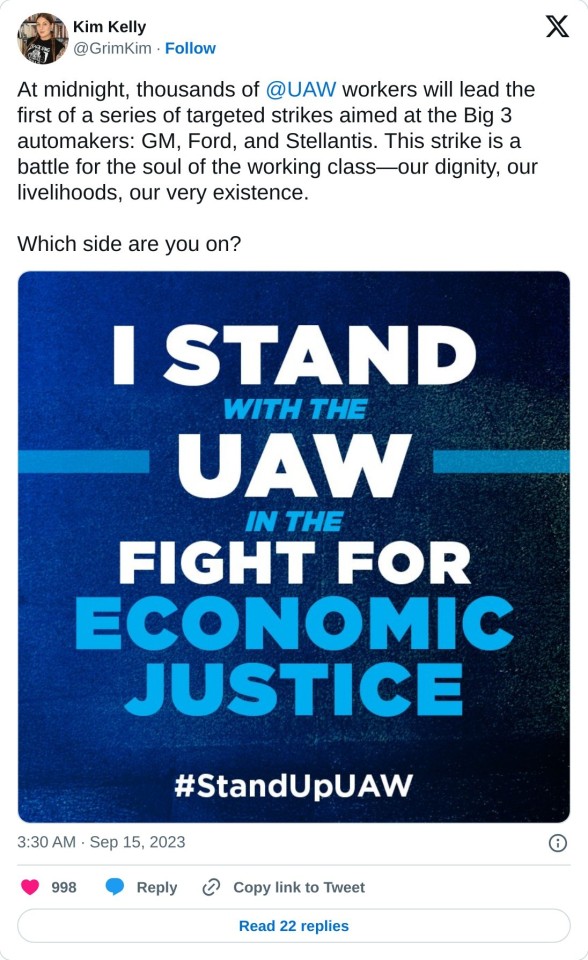

742 notes
·
View notes
Text
Hot Labor Summer!!!
The Auto Workers have begun the first ever stike against all of the Detroit Three
519 notes
·
View notes
Text

The United Auto Workers demand that Democratic National Convention organizers allow a Palestinian American speaker after uncommitted delegates pushing for this were denied.
"If we want the war in Gaza to end, we cannot ignore Palestinian American voices in the Democratic Party. For peace, real democracy, and electoral success, the Democratic Party must allow a Palestinian American speaker to address the DNC stage tonight."
#uaw strike#uaw#united auto workers#dnc 2024#dnc convention#dnc protests#dnc#democratic national convention#usa news#usa is a terrorist state#usa politics#usa#american indian#american#america#ausgov#politas#auspol#tasgov#taspol#australia#fuck neoliberals#neoliberal capitalism#anthony albanese#albanese government#palestine#free palestine#save palestine#palestinian genocide#i stand with palestine
71 notes
·
View notes
Text
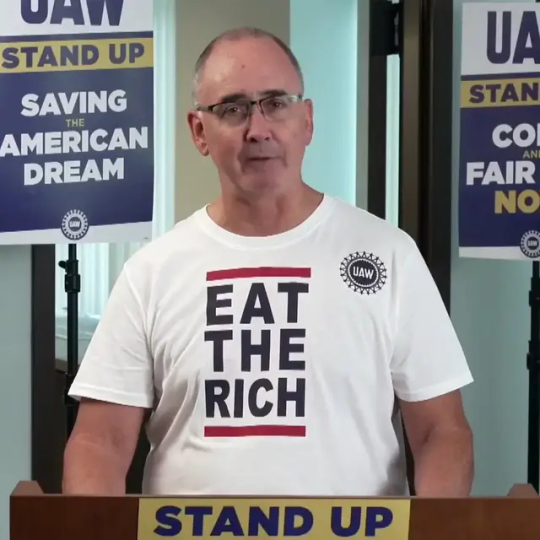
When the people shall have nothing more to eat, they will eat the rich
#eat the rich#class consciousness#class war#solidarity#the 1%#resistance#french revolution#revolution#anarchism#Rousseau#triangle of sadness#the menu#parasite#rage against the machine#luigi mangione#wealth inequality#let them eat cake#uaw#union
26 notes
·
View notes